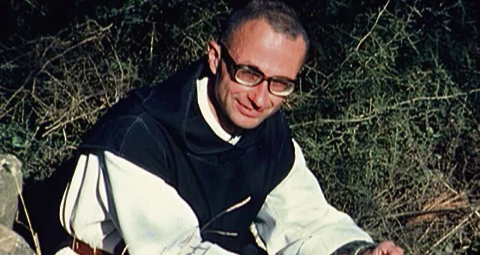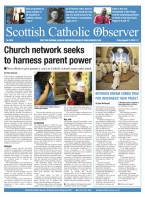December 5 | ![]() 0 COMMENTS
0 COMMENTS ![]() print
print

A story of self-sacrifice and the Eucharist
By Fr Ronald Rolhesier
In 1996, Muslim extremists martyred nearly an entire community of Trappist monks in Atlas, Algeria. Many of us, thanks to the film, Of Gods and Men, are familiar with their story and with the extraordinary faith and courage with which these monks—particularly their Abbott, Christian de Cherge—met their deaths. Indeed the last letters of Christian de Cherge (above) reveal a faith and love that is truly extraordinary.
For example, in the months leading up to his death, when he already sensed what was to befall him, he wrote a letter to his family within which he already forgave his killers and hoped that they would later be with him in heaven, with both them and him playing in the sun before God. As well, after his first face-to-face meeting with a terrorist leader, who has just beheaded nine people, he prayed: “Disarm me, disarm them.”
In his journals, which are published today, he shares this story: “On the morning of his first communion, he told his mother that he really didn’t understand what he was doing in receiving the Eucharist. His mother replied, simply: ‘You will understand later on.’” His journals then trace how his understanding of the Eucharist deepened during his lifetime, especially in the light of his interrelation with Islam and one extraordinary incident in his life. This was the extraordinary incident.
From July 1959 until January 1961, Christian was an officer serving with the French army in Algeria. While there, he befriended a man named Mohammed, a family man, a simple man, and a devout Muslim. They soon forged a very deep bond. One day, during a military skirmish, Christian was taken captive by the Algerian army. His friend, Mohammed, intervened and convinced his captors that Christian was sympathetic to their cause. Christian was released but, the following day, Mohammed was found murdered, in retaliation for his role in freeing Christian.
This act of selflessness by his Muslim friend—who in effect gave his life for Christian—permanently seared Christian’s soul. It was never far from his mind and his decision, as a monk, to return to Algeria and live in solidarity with the Muslim community at Atlas and remain there until he died, was largely a result of that foundational event, but it also deepened his understanding of the Eucharist.
His mother had told him: “You will understand later,” and now he did understand—the Eucharist doesn’t just make Jesus present, it also makes present His sacrificial death for us. Jesus died for us ‘and for the many,’ but so too did his friend, Mohammed. He also gave his death for another and in that sacrifice both imitated Jesus’ death and participated in it. Thus, for Christian, every time he celebrated the Eucharist, he celebrated too the gift of Mohammed’s sacrifice for him. His friend, Mohammed, had also shed his blood ‘for the many.’
Mohammed’s sacrifice helped Christian to recognise and more deeply appropriate Jesus’ sacrifice because he believed that, in the Eucharist, Jesus’ sacrifice and his friend’s sacrifice were both made real and both rendered present. Christian believed that Christ’s sacrifice includes the sacrifice shown in every act of sacrificial love and consequently his friend’s sacrifice was part of Christ’s sacrifice. He’s right.
At every Eucharist, we memorialise the gift that Jesus made of His death, but that memorial includes too the sacrificial gift of everyone who has imitated Jesus’ selfless love and sacrifice. In the Eucharist, the sacrifice of Christ that we memorialise includes the sacrifice of all who have died, however unconsciously, ‘for the many.’
The Eucharist is a far-reaching mystery with multiple depths and levels of meaning. We don’t ever fully grasp it. But we’re in good company. When Jesus instituted the Eucharist at the Last Supper the Apostles also didn’t really understand what He was doing, as is witnessed by Peter’s protests when Jesus tries to wash their feet. Peter’s protests show clearly that he did not comprehend what Jesus meant in this Eucharistic gesture. Jesus’ words to Peter and the Apostles are almost identical to those Christian de Cherge’s mother spoke to him when he told her that he didn’t understand the Eucharist: “Later, you will understand.”
When I made my first communion, I had a childlike understanding of the Eucharist. In my seven-year-old,
Catechised mind, I believed that I was receiving the real body of Jesus and that, at the Mass where the Eucharistic hosts were consecrated, we celebrated the sacrifice of Jesus that opened the gates of Heaven for us. Numerous theology degrees and 60 years later, I know now that what I understood about the Eucharist as a child was correct; but I also know that when those two things, Christ’s real presence and Christ’s sacrifice for us, are unpackaged, we find ourselves immersed in an ineffable mystery within which—among other things—all who sacrifice in love for us are also part of the Real Presence.
And so we keep going to Eucharist, knowing that later, we will understand.
— Fr Ronald Rolheiser is a priest and member of the Missionary Oblates of Mary Immaculate. He is president of the Oblate School of Theology in San Antonio, Texas. Visit his website at www.ronrolheiser.com










